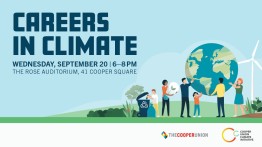Careers in Climate Panel
Wednesday, September 20, 2023, 6 - 8pm

About this event
It is increasingly clear that climate change is a challenge that can't be ignored. Attend this panel discussion to hear four Cooper alumni discuss their careers and how they are impacting the climate crisis. This program may open your eyes to some of the possible career choices for you to address one of today's biggest global problems.
Panelists:
Chris Benedict AR'86
Pamela Cabrera AR'12
Alon Dominitz CE'93 M.Eng'95
Frank Jakob ME'76
Moderated by:
Lynn Lander ChE'60
Marshall Rafal ChE'63
Panelists & Moderators Bios
Chris Benedict AR'86 is a registered architect with 30+ years of professional experience. Chris Benedict, R.A., was founded in 1995 and specializes in the design of exceptionally energy efficient buildings. A leader of the Passive House movement in the U.S., Benedict has designed over 100 apartment buildings in New York City, including a new thirteen story modular Passive House and nine existing buildings that use her groundbreaking strategy for meeting Passive House with tenants in place.
Pamela Cabrera AR'12 is a Peruvian architect and climate engineer. She is a senior associate at Transsolar Klima Engineering and an assistant adjunct professor at The Cooper Union. Her work focuses on building science and new material assemblies for passive climate control, with the goal of designing architectures that are free of fossil fuels and have a positive environmental impact. Cabrerahas a master’s degree in design studies in Energy & Environment from The Graduate School of Design at Harvard University, where she received the Daniel L. Schodek Award for Technology and Sustainability.
Alon Dominitz CE’93 is the civil engineering manager at the New York State Office of Renewable Energy Siting (ORES), which reviews siting permits for major solar and wind projects to support the state's goal of using 70% renewable energy by 2030. Dominitz holds a bachelor's degree in civil engineering and a master's of engineering degree from The Cooper Union Albert Nerken School of Engineering and is also a New York State licensed professional engineer. Prior to joining ORES, Dominitz was the Dam Safety Section Chief at the Department of Environmental Conservation, responsible for supervising the statewide Dam Safety regulatory program, including setting technical policy and supervising engineering reviews, inspections, compliance, and emergency management. He has been involved in the state’s response to every major inland flood in the last 20 years. Prior to working on dams, he regulated air pollution from combustion power plants in New York City.
Frank Jakob ME’76 spent his career engaged in the engineering of clean, green, sustainable energy solutions. He received a master's degree in mechanical engineering from the Leland Stanford Junior University. At Stanford he explored the social science of increasing energy conservation by administrative staff at school facilities. His first career at Battelle Memorial Institute began with energy efficiency projects at military housing facilities, such as increased efficiency for appliances (e.g., furnaces, air-conditioners and water heaters) and water-conserving solar-powered greenhouses for growing vegetables in desert environments, among others. He concluded his career at Black & Veatch, an EPC firm, adding electrical energy storage to solar and wind generators to produce firm, predictable generation from variable renewable energy resources.
Lynn Lander ChE’60 is a former Alumni Trustee at The Cooper Union. Lander received an M.S. in chemical engineering from The Johns Hopkins University and an M.S. in mathematics from NYU Courant Institute of Mathematical Sciences. He worked for Unilever’s R&D Center in Edgewater, NJ for 41 years where he held various director positions. He was Unilever’s voting representative to the Industrial Research Institute (IRI) and served as the corporate liaison to MIT. He co-led a global team that created and delivered a Project Management Training program and facilitated multifunctional business teams around the world. At The Cooper Union, he has served in multiple capacities, including being a regular judge for “Invention Factory” and most recently he helped Marshall Rafal start the Cooper Union Climate Initiative (CUCI).
Marshall Rafal ChE’63 is currently serving as a Trustee of The Cooper Union. Rafal received an M.S. in 1964 and a Ph.D. in 1966, both in chemical engineering from Northwestern University. In 1971, after five years at Esso Math and Systems, Inc., Rafal founded OLI Systems, Inc., a chemical engineering, computer software firm with a unique niche in prediction of complex chemical systems involving electrolytes. He is currently retired from OLI, but still serves as Chairman of the Board. OLI, which recently celebrated its 52nd anniversary, is now the foremost company in rigorous prediction of electrochemical mixtures and corrosion with a strong niche is Sustainability. Rafal founded the Cooper Union Climate Initiative (CUCI), an alumni affinity group that seeks to bring benefits to Cooper students relative to potential careers in climate.
Located in the Frederick P. Rose Auditorium, at 41 Cooper Square (on Third Avenue between 6th and 7th Streets)




